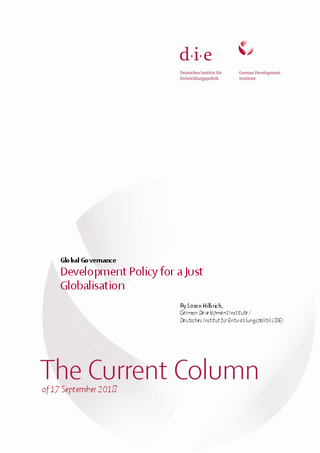Development Policy for a Just Globalisation
Hilbrich, SörenThe Current Column (2018)
Bonn: German Development Institute / Deutsches Institut für Entwicklungspolitik (DIE), The Current Column of 17 September 2018
Bonn, 17 September 2018. The current form of globalisation is not considered just by very different groups. This can be seen, for example, in the recurring protests against global governance institutions (G7, G20, WTO), the rise of nationalist currents in many OECD countries and the repeated demands by many countries in the South for more influence over international political institutions. Even in politics, it is increasingly recognised that in our globalised world justice does not only play a role within states. One section of the current German government’s coalition agreement is entitled “Development policy for a just globalisation”. International policy target agreements, such as the 2030 Agenda for Sustainable Development, also repeatedly and explicitly refer to the value of justice. At the same time, defining what constitutes this justice is highly controversial, especially at the global level. With regards to the academic debate on theories of justice, a distinction can be made between two different perspectives. The first perspective relates to justice to distributions, e.g. of goods, resources or opportunities. The criteria for distributive justice are disputed. Some emphasise the value of equality, while others call for the poor to be given priority. Yet others emphasise the role of performance and merit or believe that one must first and foremost ensure no one falls below a certain standard of living. But there is also criticism that justice refers solely to distributions: this perspective neglects how things to be distributed are produced and who decides how they are distributed. From a second perspective, therefore, justice is not understood as a particular distribution, but as the absence of arbitrary rule. This then highlights the question of how political decision-making processes should be designed. From both perspectives, there are clearly injustices in the current global economic and political system. For example, the international trade, financial and taxation system can be criticised for the distribution of benefits and burdens it causes (between different countries and between different domestic groups):
- With regard to the international trading system, the justice of the WTO-regulated trading system has always been very contentious. The current trend towards bilateral and multilateral trade agreements, however, seems even more problematic for poor countries to achieve beneficial outcomes.
- Strong growth in the financial industry, which is under-regulated and often focussed on short-term gains, is increasing the instability of the international financial system. Private investors benefit in good times, while losses, such as during the 2008 financial crisis, are partly borne by the state.
- The current international tax system is characterised by an unjust division of the tax burden between individuals, as well as an unjust division of tax revenue between countries. Tax evasion and tax avoidance contribute to this and reduce overall tax revenues.


